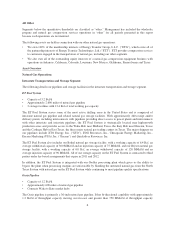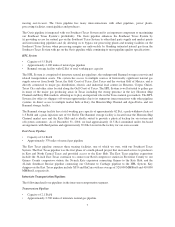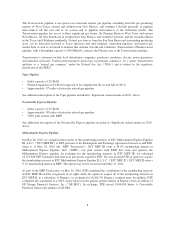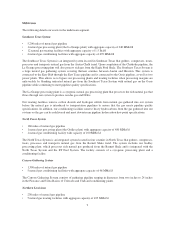Energy Transfer 2010 Annual Report Download - page 18
Download and view the complete annual report
Please find page 18 of the 2010 Energy Transfer annual report below. You can navigate through the pages in the report by either clicking on the pages listed below, or by using the keyword search tool below to find specific information within the annual report.markets, to protect the integrity of such markets, and to improve the FERC’s ability to assess market forces and
detect market manipulation. The FERC also requires interstate pipelines and certain major non-interstate
pipelines to post, on a daily basis, capacity, scheduled flow information and actual flow information. As these
posting requirements for major non-interstate pipelines are currently on appeal before the U.S. 5th Circuit Court
of Appeals, it is not known with certainty the precise form these requirements will ultimately take. Full
compliance with these regulations could subject us to further costs and administrative burdens, none of which are
expected to have a material impact on our operations.
Our intrastate natural gas operations are also subject to regulation by various agencies in Texas, principally the
Texas Railroad Commission (“TRRC”). Our intrastate pipeline and storage operations in Texas are also subject
to the Texas Utilities Code, as implemented by the TRRC. Generally, the TRRC is vested with authority to
ensure that rates, operations and services of gas utilities, including intrastate pipelines, are just and reasonable
and not discriminatory. The rates we charge for transportation services are deemed just and reasonable under
Texas law unless challenged in a customer or TRRC complaint. We cannot predict whether such a complaint will
be filed against us or whether the TRRC will change its regulation of these rates. Failure to comply with the
Texas Utilities Code can result in the imposition of administrative, civil and criminal remedies.
Sales of Natural Gas and NGLs. The price at which we buy and sell natural gas currently is not subject to
federal regulation and, for the most part, is not subject to state regulation. The price at which we sell NGLs is not
subject to federal or state regulation.
To the extent that we enter into transportation contracts with natural gas pipelines that are subject to FERC
regulation, we are subject to FERC requirements related to use of such capacity. Any failure on our part to
comply with the FERC’s regulations and policies, or with an interstate pipeline’s tariff, could result in the
imposition of civil and criminal penalties.
Our sales of natural gas are affected by the availability, terms and cost of pipeline transportation. As noted above,
the price and terms of access to pipeline transportation are subject to extensive federal and state regulation. The
FERC is continually proposing and implementing new rules and regulations affecting those segments of the
natural gas industry. These initiatives also may affect the intrastate transportation of natural gas under certain
circumstances. The stated purpose of many of these regulatory changes is to promote competition among the
various sectors of the natural gas industry and these initiatives generally reflect more light-handed regulation. We
cannot predict the ultimate impact of these regulatory changes to our natural gas marketing operations, and we
note that some of the FERC’s regulatory changes may adversely affect the availability and reliability of
interruptible transportation service on interstate pipelines. We do not believe that we will be affected by any such
FERC action in a manner that is materially different from other natural gas marketers with whom we compete.
Gathering Pipeline Regulation.Section 1(b) of the NGA exempts natural gas gathering facilities from the
jurisdiction of the FERC under the NGA. We own a number of natural gas pipelines in Texas, Louisiana,
Colorado, West Virginia and Utah that we believe meet the traditional tests the FERC uses to establish a
pipeline’s status as a gatherer not subject to FERC jurisdiction. However, the distinction between the FERC-
regulated transmission services and federally unregulated gathering services has been the subject of substantial
litigation and varying interpretations, so the classification and regulation of our gathering facilities could be
subject to change based on future determinations by the FERC and the courts. State regulation of gathering
facilities generally includes various safety, environmental and, in some circumstances, nondiscriminatory take
requirements and complaint-based rate regulation.
In Texas, our gathering facilities are subject to regulation by the TRRC under the Texas Utilities Code in the
same manner as described above for our intrastate pipeline facilities. Louisiana’s Pipeline Operations Section of
the Department of Natural Resources’ Office of Conservation is generally responsible for regulating intrastate
pipelines and gathering facilities in Louisiana and has authority to review and authorize natural gas transportation
transactions and the construction, acquisition, abandonment and interconnection of physical facilities.
16
























